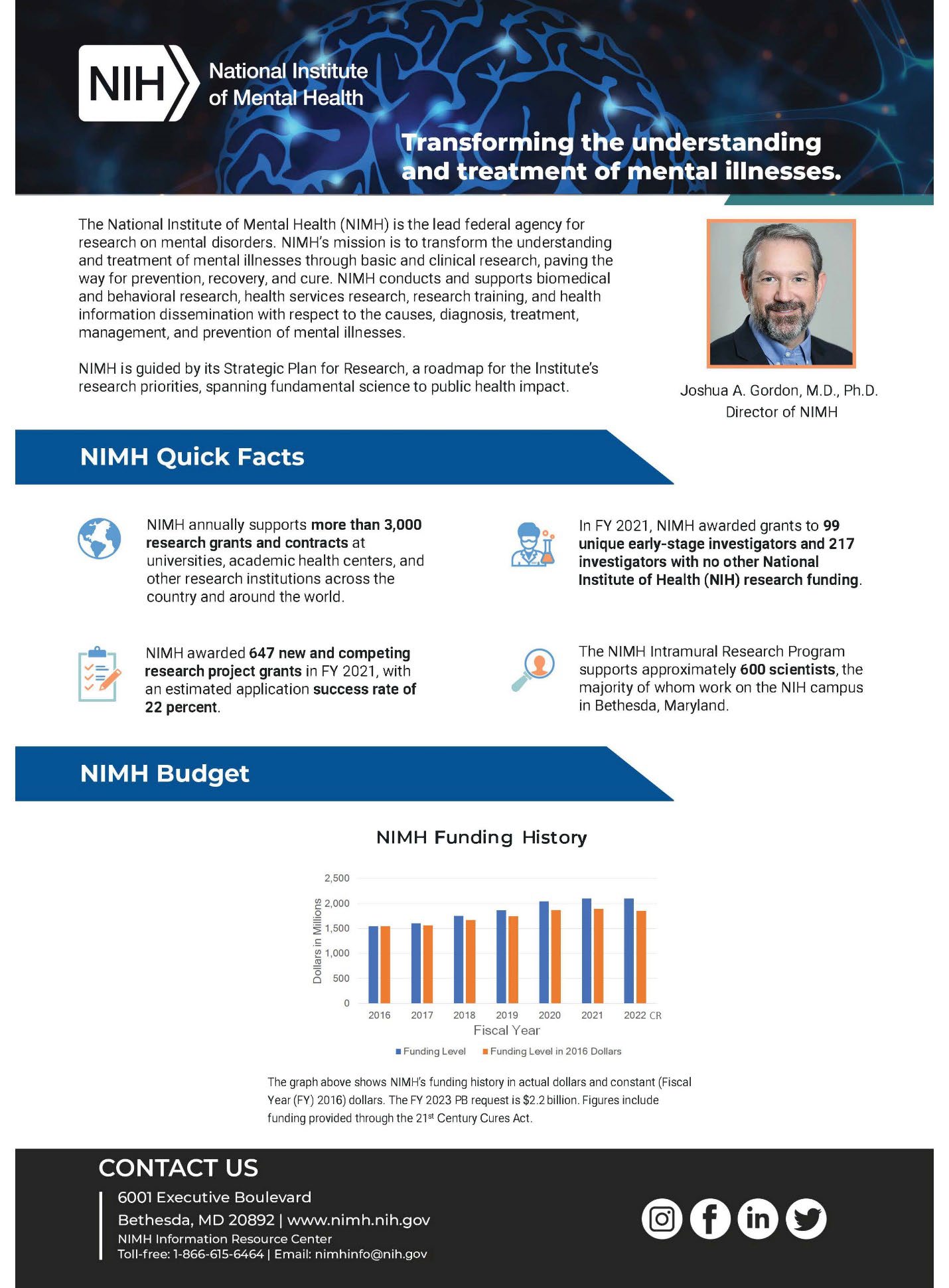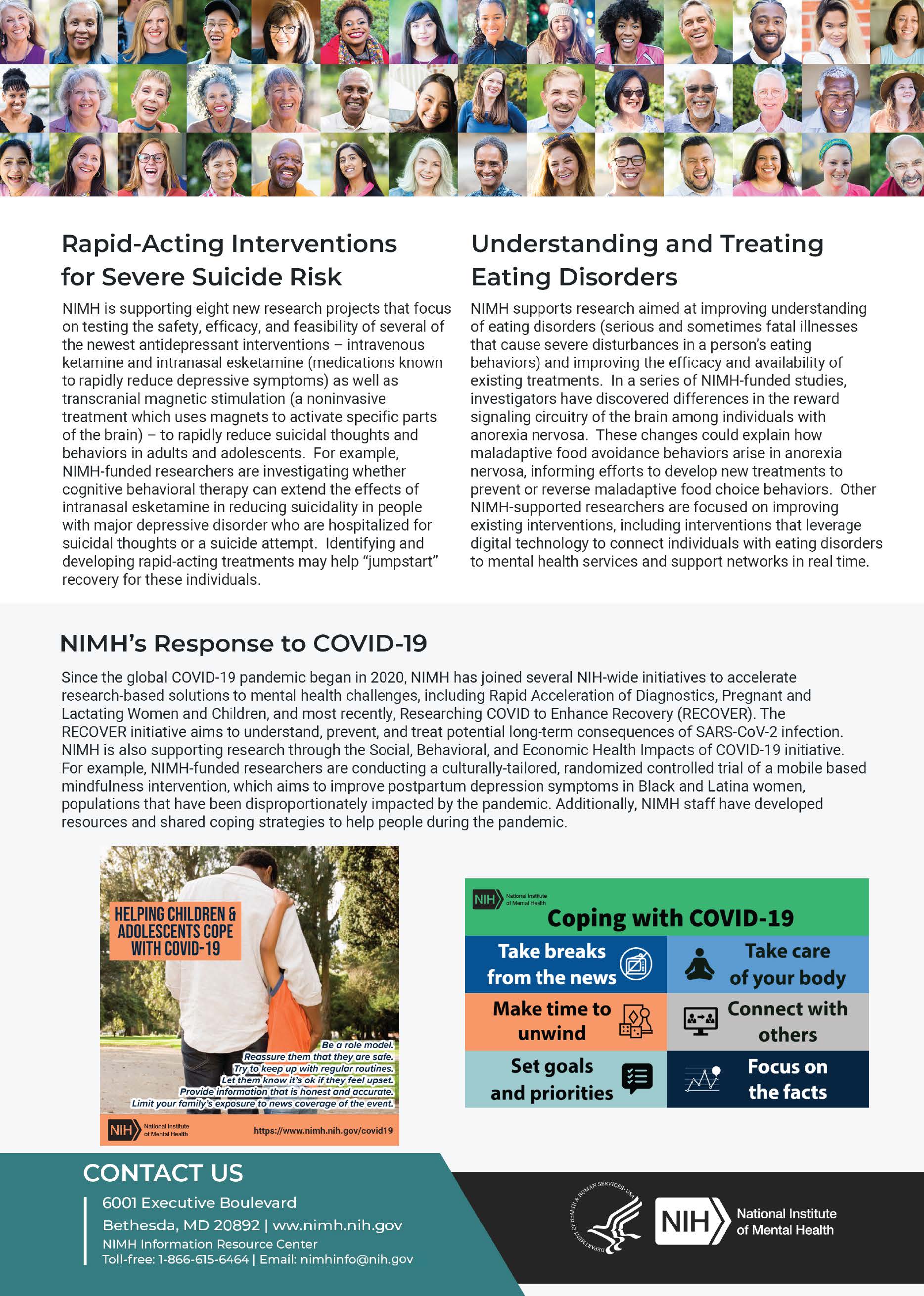FY 2023 Budget - Congressional Justification Image Descriptions

Transforming the understanding and treatment of mental illnesses.
The National Institute of Mental Health (NIMH) is the lead federal agency for research on mental disorders. NIMH’s mission is to transform the understanding and treatment of mental illnesses through basic and clinical research, paving the way for prevention, recovery, and cure. NIMH conducts and supports biomedical and behavioral research, health services research, research training, and health information dissemination with respect to the causes, diagnosis, treatment, management, and prevention of mental illnesses. NIMH is guided by its Strategic Plan for Research, a roadmap for the Institute’s research priorities, spanning fundamental science to public health impact.
NIMH Quick Facts
NIMH annually supports more than 3,000 research grants and contracts at universities, academic health centers, and other research institutions across the country and around the world.
In FY 2021, NIMH awarded grants to 99 unique early-stage investigators and 217 investigators with no other National Institute of Health (NIH) research funding NIMH awarded 647 new and competing research project grants in FY 2021, with an estimated application success rate of 22 percent.
The NIMH Intramural Research Program supports approximately 600 scientists, the majority of whom work on the NIH campus in Bethesda, Maryland.
Contact NIMH
6001 Executive Boulevard
Bethesda, MD 20892 | www.nimh.nih.gov
NIMH Information Resource Center Toll-free: 1-866-615-6464 | Email: nimhinfo@nih.giv

Rapid-Acting Interventions for Severe Suicide Risk
NIMH is supporting eight new research projects that focus on testing the safety, efficacy, and feasibility of several of the newest antidepressant interventions – intravenous ketamine and intranasal esketamine (medications known to rapidly reduce depressive symptoms) as well as transcranial magnetic stimulation (a noninvasive treatment which uses magnets to activate specific parts of the brain) – to rapidly reduce suicidal thoughts and behaviors in adults and adolescents. For example, NIMH-funded researchers are investigating whether cognitive behavioral therapy can extend the effects of intranasal esketamine in reducing suicidality in people with major depressive disorder who are hospitalized for suicidal thoughts or a suicide attempt. Identifying and developing rapid-acting treatments may help “jumpstart” recovery for these individuals.
Understanding and Treating Eating Disorders
NIMH supports research aimed at improving understanding of eating disorders (serious and sometimes fatal illnesses that cause severe disturbances in a person’s eating behaviors) and improving the efficacy and availability of existing treatments. In a series of NIMH-funded studies, investigators have discovered differences in the reward signaling circuitry of the brain among individuals with anorexia nervosa. These changes could explain how maladaptive food avoidance behaviors arise in anorexia nervosa, informing efforts to develop new treatments to prevent or reverse maladaptive food choice behaviors. Other NIMH-supported researchers are focused on improving existing interventions, including interventions that leverage digital technology to connect individuals with eating disorders to mental health services and support networks in real time.
NIMH’s Response to COVID-19
Since the global COVID-19 pandemic began in 2020, NIMH has joined several NIH-wide initiatives to accelerate research-based solutions to mental health challenges, including Rapid Acceleration of Diagnostics, Pregnant and Lactating Women and Children, and most recently, Researching COVID to Enhance Recovery (RECOVER). The RECOVER initiative aims to understand, prevent, and treat potential long-term consequences of SARS-CoV-2 infection. NIMH is also supporting research through the Social, Behavioral, and Economic Health Impacts of COVID-19 initiative. For example, NIMH-funded researchers are conducting a culturally-tailored, randomized controlled trial of a mobile based mindfulness intervention, which aims to improve postpartum depression symptoms in Black and Latina women, populations that have been disproportionately impacted by the pandemic. Additionally, NIMH staff have developed resources and shared coping strategies to help people during the pandemic.
Helping Children and Adolescents Cope with COVID-19
Disponible en español
When parents and caregivers deal with COVID-19 calmly and confidently, they can provide the best support for their children. There are many things you can do to support your child cope. Visit the Centers for Disease Control and Prevention for more information: https://go.usa.gov/xMcpj. #shareNIMH
Coping with COVID-19
Disponible en español
It can be difficult to cope with fear and anxiety, changing daily routines, and a general sense of uncertainty about COVID-19. Although people respond to stressful situations in different ways, there are steps you can take to help manage stress. Visit the Centers for Disease Control and Prevention for more information at https://go.usa.gov/xMcpj. #shareNIMH
